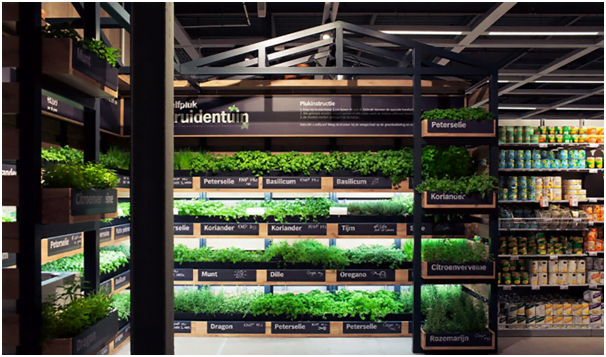Let’s take a look at two things that will define the future shopping trends: the evolution of fruit and vegetable trade, and the development of the real estate market and urban farming.
Let’s start with real estate and urban farming.
In the Eastern Europe region, “smart home” is still something very futuristic. In comparison, in the USA, according to various estimates, almost every third house is equipped with such a system. It includes all aspects of managing all home systems: heating, lighting, power supply, ventilation, electrical appliances, security, watering the lawn, and much more. Besides, many houses and apartments have automatic watering of home plants, and the humidity sensors give a signal to the Smart Day system to water the plant when necessary.
Yes, this is the new trend: urban agriculture in private houses and apartments. What might it look like?
Many houses are already sold and advertised as “property with fruit trees and shrubs,” but many fear these options since taking care of them is expensive. But what if the property has its own fully automated urban farm for growing salads, herbs, strawberries, and other berries? Imagine the green wall of a house or an apartment with beautiful and entirely environmentally friendly berries hanging from it, with decorative lighting that can become a fancy decoration to any room? By the way, why not implementing this in offices? Urban farming walls could create an exciting cozy space and provide clean and useful products for employees. Such production requires a minimum area, and it will be possible to order a ready-made set of everything necessary for a new production cycle in any store.
Of course, now, it is not economically feasible. There is still a necessity to improve the growing technologies, reduce the cost of lighting systems and their efficiency, work out the issues of providing plants with food, and much more. But this is only a matter of time if someone will systematically work on this. In this case, each person will be able to provide their family with fresh herbs, salads, and, possibly, berries, even living in an apartment of a multi-story building, regardless of the climatic conditions.
This will have a positive impact on human health and the ecology of the Earth, and allow people to save much money on food when technology becomes more accessible. Indeed, salads, herbs, and berries are delivered over very long distances, often by air, which leads to a significant amount of harmful emissions into the atmosphere and increases production cost. The products themselves are still not perfectly fresh. Picking greens or berries at home will add a lot to freshness and taste. Moreover, as the selection process evolves, new delicious varieties appear.
As you can guess, with time, the autonomy of houses will increase significantly, and they will learn how to store electricity better. The cost of solar panels will decrease even more, and their efficiency will improve. Therefore, many houses will charge their home batteries during the day and become self-sufficient in electricity, without the need to connect to city networks. Using part of this energy to grow products directly in the house will be a logical next step. Besides, when connected to the smart home system, the plants can easily survive if everyone went on vacation for a week or two. Watering and light will work without interruption.
This can have severe consequences for the businesses that supply greens and salads. The industry, of course, will not disappear at all. Still, many will have to change from producing greens and berries to delivering everything one needs for their cultivation in urban conditions.
As for the real estate, a fully self-sustaining house or even an apartment with its own farm can be an absolutely unique advantage in the real estate market.
As for the future of the fruit and vegetable trade, the COVID-19 crisis showed us that having food delivered to our homes is a good option. However, it also became evident that companies who deliver cannot handle a large assortment of fruits and vegetables, because there are many problems with perishable products like greens, lettuce, and berries. At the same time, oranges, apples, bananas, tangerines, and other fruits, which remain fresh longer, are easier to sell in online formats.
Accordingly, if greens, lettuce, or berries are grown at home, the demand for them in online shops may decrease. Thus, it will also indirectly contribute to the development of e-commerce in fruits and vegetables.
Will salads be sold in ordinary grocery stores? Most likely yes, but it is possible that the stores themselves will become smaller and people will visit them much less frequently. Moreover, even grocery stores may have their production of greens and salads. That is, greens and salads will be grown on shelves rather than put there by the supplier. The example from today’s realities is the Albert Hein supermarket in the Netherlands.

Therefore, it is possible to note the following trends in the long term:
- a decrease in the volume of commercial production of greens and herbs, as well as some berries;
- a sharp decrease in the distance that an average bunch of greens or lettuce travels before it reaches the consumer;
- the transition from city farms to home farms;
- an increase in the supply of solutions for providing home farms with everything necessary and connecting them to smart home systems;
- reducing the cost of greens, salads, and even berries by consumers and reducing the retail trade of this category of goods.
These trends will be most relevant in countries with a cold and temperate climate, where people spend much more time indoors than in countries with a warm or tropical climate. Besides, in these countries, people pay more for fresh products, and companies deal with the problem of excess emissions of CO2 and harmful substances in the delivery of these products to consumers.
The use of the site materials is free if there is a direct and open for search engines hyperlink to a specific publication of the East-Fruit.com website.




